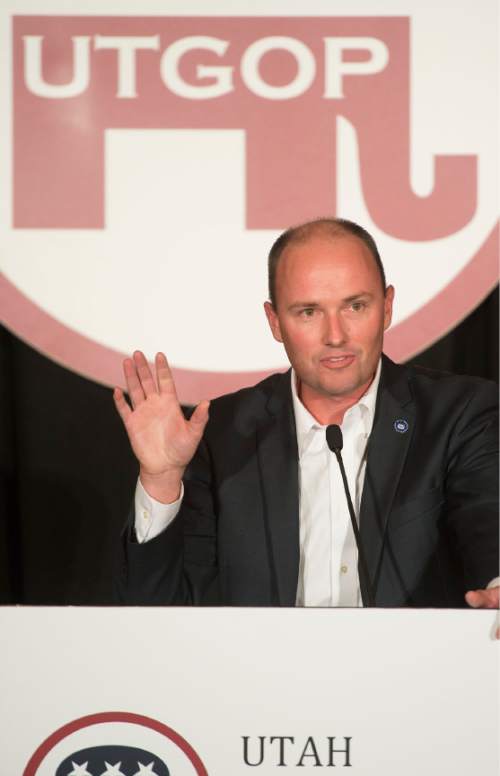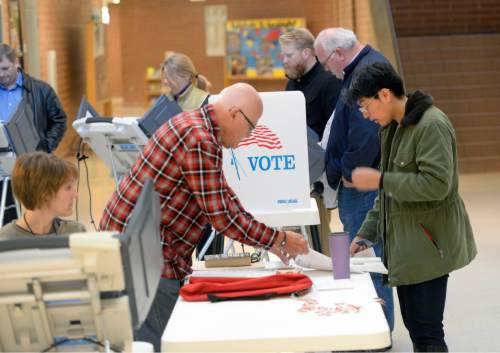This is an archived article that was published on sltrib.com in 2016, and information in the article may be outdated. It is provided only for personal research purposes and may not be reprinted.
Candidates who gather signatures to get on the primary ballot and voters who circulate or sign the petitions cannot be thrown off the ballot or disqualified from voting in party primaries, according to a memo Tuesday by Lt. Gov. Spencer Cox, Utah's chief elections officer.
"Because [the law] specifically allows candidates to choose signature gathering, candidates [who] rely on the law and meet all other legal requirements will be placed on the primary ballot," Cox said in a memo to candidates and voters Tuesday. "Any attempts to remove candidates from the ballot for following the law and gathering signatures will be rejected."
The Utah Republican Party went back to court last week, filing a second lawsuit seeking to overturn SB54, a dramatic overhaul of Utah's election law that went into effect this year.
The law allows candidates seeking a political party's nomination to either gather a required number of signatures on a petition or attend the party's traditional convention and win support from the delegates or both.
In his letter, Cox said his office had tried to work through the issues with the Republican Party and had planned to go to the Utah Supreme Court for a ruling on the differing interpretations.
"We recently received notice that they had changed their mind and decided to file suit in federal court against the state to challenge this and other provisions of the election code," Cox wrote.
Utah Republican Party Chairman James Evans disputes that portrayal, saying "It's just not true."
"Why would you say something like that when the [attorney general's] office is the one who said go ahead and move forward and file?" he said. "We didn't walk away form any deal. At least we thought we were complying with what we where asked to do."
Parker Douglas, chief of staff to Attorney General Sean Reyes said he never told the party to go to federal court and file its lawsuit. Instead, he urged the party to file before the Utah Supreme Court and only on the issue of whether the party gets to choose the nominating path or if the law gives the candidate the ability to choose.
He said the dispute deals with an interpretation of state law, which belongs before the state Supreme Court and he believes it would be heard more expeditiously in state court rather than having a federal judge send parts of the dispute to the Supreme Court, as U.S. District Judge David Nuffer is doing.
On Tuesday, Nuffer said the parties will have 14 days to lay out the specific disputes and identify which issues may best be decided by the Utah Supreme Court, indicating the lawsuit will move forward quickly.
Evans said that, generally, Cox's memo is just restating his position on the law and "until and if the court says something different, this is what it is."
The Utah GOP argues in its lawsuit that SB54 lets the party choose which of the two paths to take and the party's bylaws recognize only the convention path.
Moreover, the party rules require candidates to abide by the party's bylaws to be recognized as members of the party, which, according to the GOP, means anyone who doesn't go to the convention and get at least 40 percent of the delegate support will not be allowed to appear on the primary ballot.
U.S. Sen. Mike Lee and Gov. Gary Herbert — with Cox on the ticket — have both said they will gather signatures and go to the party convention.
The state has not formally responded to the lawsuit, but Cox, in his memo, disagrees and says the party has no grounds to exclude candidates who abide by the law.
He said voters who sign petitions cannot be excluded from voting in Republican primary elections — a rumor that had been circulating in the GOP circles and on social media in recent weeks.
The lieutenant governor did back away from previous statements on one point — that the Utah Republican Party could lose its status as a qualified political party if it attempts to exclude candidates or voters.
In an earlier letter to Sen. Todd Weiler, R-Woods Cross, state elections director Mark Thomas said such disqualification was one possible outcome, which would mean that Republican candidates who went to convention would not be recognized and the only path to the ballot would be through collecting signatures.
But Cox said the party certified it would comply with the law and, because there is no provision in the law allowing the party to be disqualified, he will not strip the Republican Party of its recognized status.
"While I reject the possibility of removing candidates that rely on the law to get on the ballot by gathering signatures, I also reject the possibility of removing candidates that rely on the law to participate in the caucus/convention system," he said.
Twitter: @RobertGehrke





